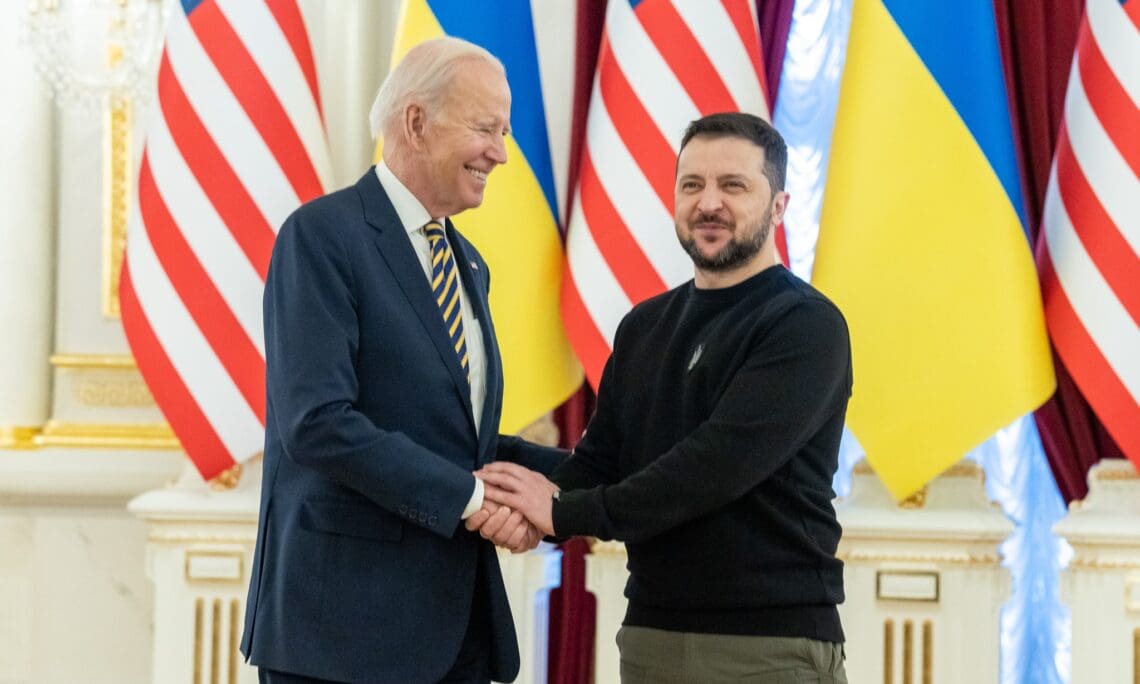Senate leaders on Sunday released the details of a long-awaited comprehensive border security bill, which also contains a substantial foreign aid component.
The discussions, led by Senators James Lankford (R-OK), Krysten Sinema (I-AZ), and Chris Murphy (D-CT), come after months of negotiations with the Biden regime, seeking to address both the ongoing crisis at the U.S. southern border and foreign policy commitments abroad.
The 370-page deal, according to Senator Patty Murray (D-WA), Chair of the Senate Appropriations Committee, claims it reflects weeks of good-faith negotiations, balancing domestic concerns with urgent international aid needs.
“As Ukraine runs low on ammunition to fend off Putin’s brutal invasion, it is imperative we finally extend our support,” Murray said in a statement.
“We must also live up to our commitments to our allies around the globe and quickly get more aid to innocent civilians caught in conflict, including in Gaza, where the humanitarian crisis is especially dire. I never believed we should link policy demands to emergency aid for our allies, but Republicans insisted—so Democrats negotiated in good faith over many weeks and now there is a bipartisan deal on border policy legislation. Ukraine’s fate and so much more hangs in the balance—it’s time for Congress to act.”
The comprehensive $118.28 billion national security supplemental package, totaling $118.28 billion, allocates a staggering $60.06 billion to Ukraine in response to Russia’s aggressive military actions.
In contrast, U.S. border security efforts are earmarked to receive $20.23 billion. This disparity in funding allocation has raised eyebrows and sparked a debate over the Senate’s priorities at a time when domestic border security challenges persist.
The substantial financial support for Ukraine overshadows the pressing needs at the U.S. southern border. The border has been a hotbed of crisis, with increasing numbers of illegal aliens, a surge in fentanyl trafficking, and ongoing operational challenges for border enforcement agencies.
The $20.23 billion allocated for border security, though significant, falls short of addressing the full scope of the crisis, especially in comparison to the foreign aid being dispensed.
Since Russia’s invasion in February 2022, the US has committed over $75 billion in assistance, including $46.3 billion in security assistance to Ukraine.
The package also includes $14.1 billion in security assistance for Israel and billions more for humanitarian assistance in conflict zones, including Gaza and the West Bank, further diluting the focus on domestic security needs.
House Speaker Mike Johnson will also introduce a bill to send $17.6 billion to Israel in emergency aid without corresponding spending cuts amid a fight over border security.
The first standalone Israel aid package voted on included IRS cuts, which, of course, received heavy backlash from Democrats and was rejected by Senate Majority Leader Chuck Schumer. The new Israel funding bill will exclude the IRS cuts.
According to Murray, the $118.28 billion national security supplemental package includes:
- $60.06 billion to support Ukraine as it fights back against Putin’s bloody invasion and protects its people and sovereignty.
- $14.1 billion in security assistance for Israel.
- $2.44 billion to support operations in the U.S. Central Command and address combat expenditures related to conflict in the Red Sea.
- $10 billion in humanitarian assistance to provide food, water, shelter, medical care, and other essential services to civilians in Gaza and the West Bank, Ukraine, and other populations caught in conflict zones across the globe.
- $4.83 billion to support key regional partners in the Indo-Pacific and deter aggression by the Chinese government.
- $2.33 billion to continue support for Ukrainians displaced by Putin’s war of aggression and other refugees fleeing persecution.
- The bipartisan border policy changes negotiated by Senators Chris Murphy (D-CT), Kyrsten Sinema (I-AZ), and James Lankford (R-OK).
- $20.23 billion to address existing operational needs and expand capabilities at our nation’s borders, resource the new border policies included in the package, and help stop the flow of fentanyl and other narcotics.
- The Fentanyl Eradication and Narcotics Deterrence (FEND) Off Fentanyl Act.
- $400 million for the Nonprofit Security Grant Program to help nonprofits and places of worship make security enhancements.
Proponents of a stronger emphasis on border security argue that while international aid is crucial, the allocation should not come at the expense of securing the nation’s borders and safeguarding its citizens from the ramifications of unchecked immigration and narcotics trafficking.
The Gateway Pundit previously reported that U.S. intelligence officials have warned of an increasing threat posed by the Lebanese Hezbollah terrorist group, suggesting that it might strike American interests in the Middle East or even within the United States.
In October, during an address to the International Association of Chiefs of Police conference in San Diego, California, FBI Director Chris Wray issued a dire warning about the rise of violent extremism, both domestic and international.
Wray indicated that there has been a significant uptick in reported threats following the attacks in Israel, cautioning the public to remain vigilant for “lone actors.”
According to an internal memo dated Oct. 20, which was obtained by the Daily Caller News Foundation, the CBP San Diego field office sent out a memo to its officers warning of Jihadists trying to get into the U.S. through the southern border. The terrorist attacks against Israel have potentially inspired Hamas, Hezbollah, and other Jihadists to make their way into our nation.
“San Diego Field Office Intelligence Unit assesses that individuals inspired by, or reacting to the current Israel-Hamas conflict may attempt travel to or from the area of hostilities in the Middle East via circuitous transit across the Southwest border,” the memo reads.
“Foreign fighters motivated by ideology or mercenary soldiers of fortune may attempt to obfuscate travel to or from the US to or from countries in the Middle East through Mexico,” the memo adds.
You can read the text of the legislation below:


Leave a Comment